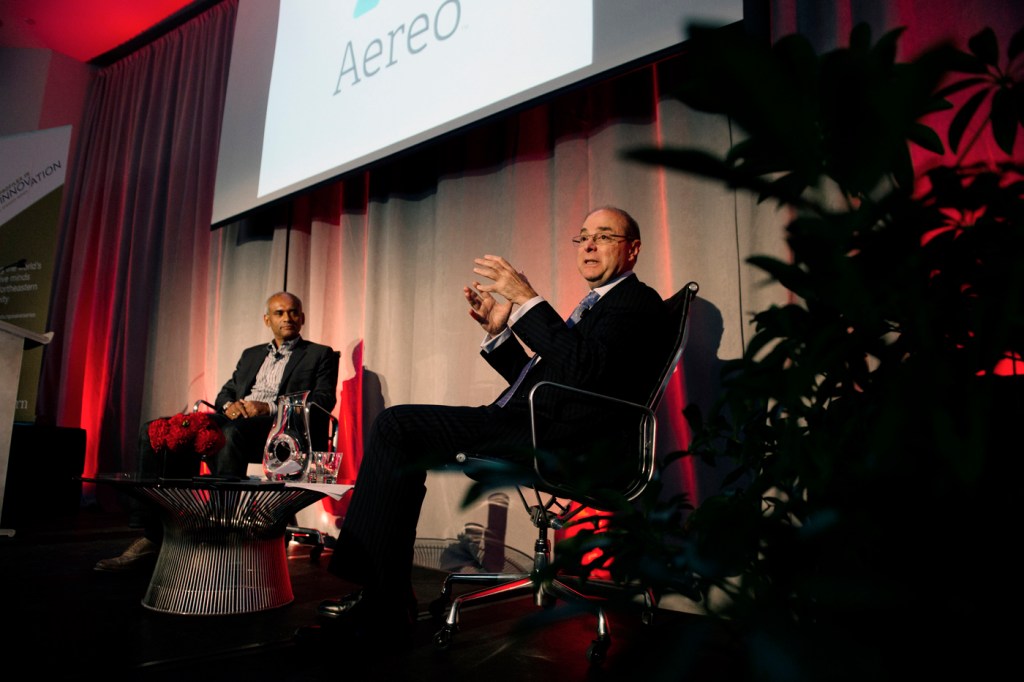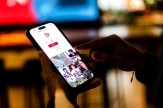The revolution will be televised

When you buy an album on iTunes, Apple does not force you to purchase the band’s entire discography. Northeastern alumnus Chet Kanojia, a digital media technologist, envisions a future in which the same pick and pay principle would be applied to cable TV at a one-stop Internet shop.
“What if there were a location on the Internet where you could pick and choose what you want to watch and pay a rational price for it without any packaging restrictions?” asked Kanojia. As the founder and CEO of Aereo, a groundbreaking online television platform, his goal is simple yet ambitious: “I want to change how consumers access, pay for, and view TV.”
Kanojia discussed his grand vision for the future of television with more than 100 students, faculty, and staff who filled the Raytheon Amphitheater on Monday evening for the sixth installment in the Profiles in Innovation Presidential Speakers Series. Several hundred people also watched the event live via Northeastern’s Facebook page.
Northeastern President Joseph E. Aoun, who led the discussion with Kanojia, hosts the Profiles in Innovation series, which is designed to bring the world’s most creative minds to campus for conversations on innovation and entrepreneurship.
Kanojia fits the mold. In the late 1990s, he founded Navic Networks, which he built into the industry’s undisputed leader in advanced television advertising before selling it to Microsoft for about $250 million in 2008. In 2012, he founded Aereo, which uses dime-sizes antennas to stream live and recorded TV signals from broadcast networks to customers’ tablets, smartphones, and computers. The service, which Kanojia describes as “fascinating, bold, and crazy,” costs $8 a month and is currently available in seven cities, including Boston, New York, and Miami.
Kanojia’s small antennas are causing a big stir among a consortium of major broadcasters bent on quashing the company in court. While Fox, CBS, ABC, and NBC have argued that Aereo is violating copyright law by streaming programming without permission, Kanojia counters that “all consumers have a right to access broadcast television for free using an antenna.”
The majority of Monday’s hourlong event focused on Kanojia’s plan for transforming the TV industry, which he revealed in a short lecture followed by an in-depth Q-and-A. First he discussed the history of Aereo, which has morphed from an idea on the back of a napkin into a thriving company with more than $60 million in investment capital. Then he fielded questions from audience members, social media users, and President Aoun on topics ranging from his entrepreneurial drive and hiring philosophy to his leadership strategy and relationship with Barry Diller, the media mogul who has invested more than $20 million Aereo.
Aoun asked Kanojia when he realized he wanted to become an entrepreneur. It was in 1993, the year Kanojia earned his master’s degree in computer systems engineering from Northeastern, he said, when he was working in Saudi Arabia and reading a biography of Microsoft cofounder Bill Gates called Hard Drive. The book “gave me the impetus to say that it’s possible to create,” Kanojia explained. “I was driven by distinction.” His experience at Northeastern stoked a similar fire in him to succeed in the business world: “I learned immense life lessons at this school,” he said. “In hindsight, I realized how powerful they were.”
A Twitter user asked Kanojia to divulge the secret to good leadership, to which he responded: “The biggest thing you have to master is your own pathology and your own fear. You can’t be afraid of making decisions, and you have to be transparent.”
When a second-year student asked Kanojia to name Aereo’s biggest obstacles to transforming the TV industry, he turned the question on its head. “This is a company of destiny,” Kanojia said. “We thought it would be hard to raise money, but people are lining up and saying ‘take our money.’ At the end of the day, we recognize that [web-based TV] is inevitable and maybe we are the ones to do it.”
Watch the full discussion below:





